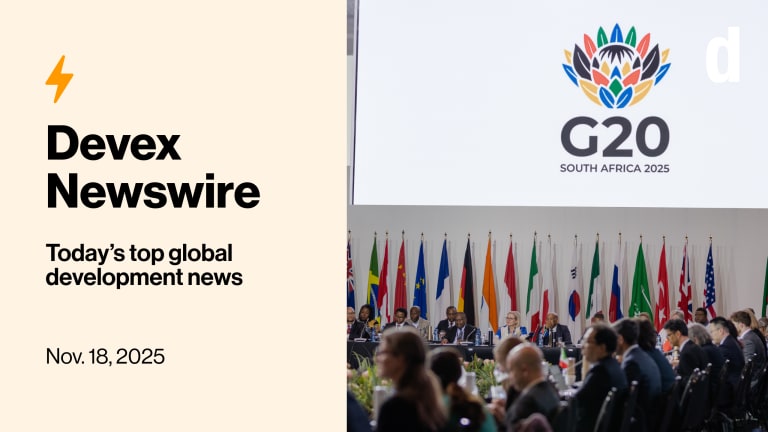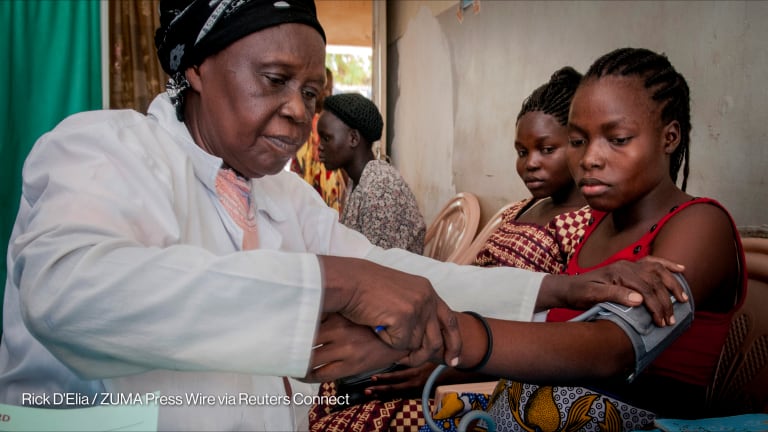
Ten million COVID-19 vaccines partially produced in South Africa are being exported to Europe in August and September, according to an op-ed published in the Guardian by former U.K. Prime Minister Gordon Brown.
This comes as many African nations have waited for access to adequate numbers of doses all year, with high-income countries hoarding vaccines rather than working to immunize the most vulnerable portions of society around the world. Many African nations have gone through third and fourth waves of the coronavirus pandemic and seen their health systems overwhelmed, as less than 2% of the continent’s population has been fully vaccinated.
South Africa's Aspen to boost COVID-19 vaccine manufacturing, says AU
Aspen Pharmacare is planning to increase its manufacturing capacity for Johnson & Johnson’s COVID-19 vaccine in South Africa by 200 million doses annually, says a special envoy for the African Union.
“In a shocking symbol of the west’s failure to honour its promise of equitable vaccine distribution, millions of Covid vaccines manufactured in Africa that should have saved the lives of Africans have been shipped to Europe in recent weeks,” Brown wrote.
Nearly 500 million COVID-19 vaccines have been administered in the European Union, which has a population of about 440 million people, he wrote. Meanwhile, the African continent’s population is roughly three times that figure.
South Africa’s Aspen Pharmacare operates the plant exporting the millions of Johnson & Johnson vaccine doses to Europe. Aspen is also manufacturing doses for the African Union’s African Vaccine Acquisition Trust. AVAT entered into an agreement with J&J for up to 400 million doses through 2022, with African nations able to purchase them using financing from the World Bank.
But allocations to African countries, which have already purchased doses, are currently limited by Aspen’s manufacturing capacity. Shipments began this month, with 6.4 million of these doses expected to arrive in countries in August, accelerating to 10 million in September. This is expected to ramp up to 31 million doses per month in January when Aspen increases its manufacturing capacity.
In recent months, African nations were left scrambling without promised doses from COVAX after the Indian government restricted exports of vaccines in March, prioritizing its domestic supply to respond to its own health crisis.
According to Strive Masiyiwa, a special envoy for the African Union, a key reason the AU decided to work with J&J, with doses manufactured by the Aspen manufacturing plant, was to ensure they would actually make their way to African nations.
“It was clear to us by January that vaccine nationalism was being played out over production assets. That is where it is played out. The countries with the production assets control the release of vaccines,” he said during a press conference last month. “We at least could rely on one production asset which was on African soil, which was the Aspen facility.”
“The only thing we can rely on is what is happening on our continent,” he said at a separate press conference in August.
Sign up for Devex CheckUp
The must-read weekly newsletter for exclusive global health news and insider insights.
According to Brown’s op-ed, J&J vaccines are only being exported to Europe in the short term. He said South African President Cyril Ramaphosa threatened to ban all vaccine exports from South Africa until “Europe agreed all J&J’s future African-produced vaccines could stay in Africa from October.”
The Aspen agreement is for “fill and finish” of doses, which means the facility in South Africa fills vials with vaccine it receives from elsewhere and then ships them. Some say that this still leaves African nations dependent on decision-makers outside of the continent, arguing that pharmaceutical companies should instead transfer the technology for these manufacturers to fully produce the doses.
The International Finance Corporation, German development finance institution DEG, French DFI Proparco, and the U.S. International Development Finance Corporation announced €600 million in financing for Aspen at the end of June, aiming to support its vaccine production and strengthen the company. Aspen intends to increase its production capacity by next year.
Brown added he was told the AU also “had no choice but to open negotiations with China to buy at least 200m Chinese-made vaccines.”









